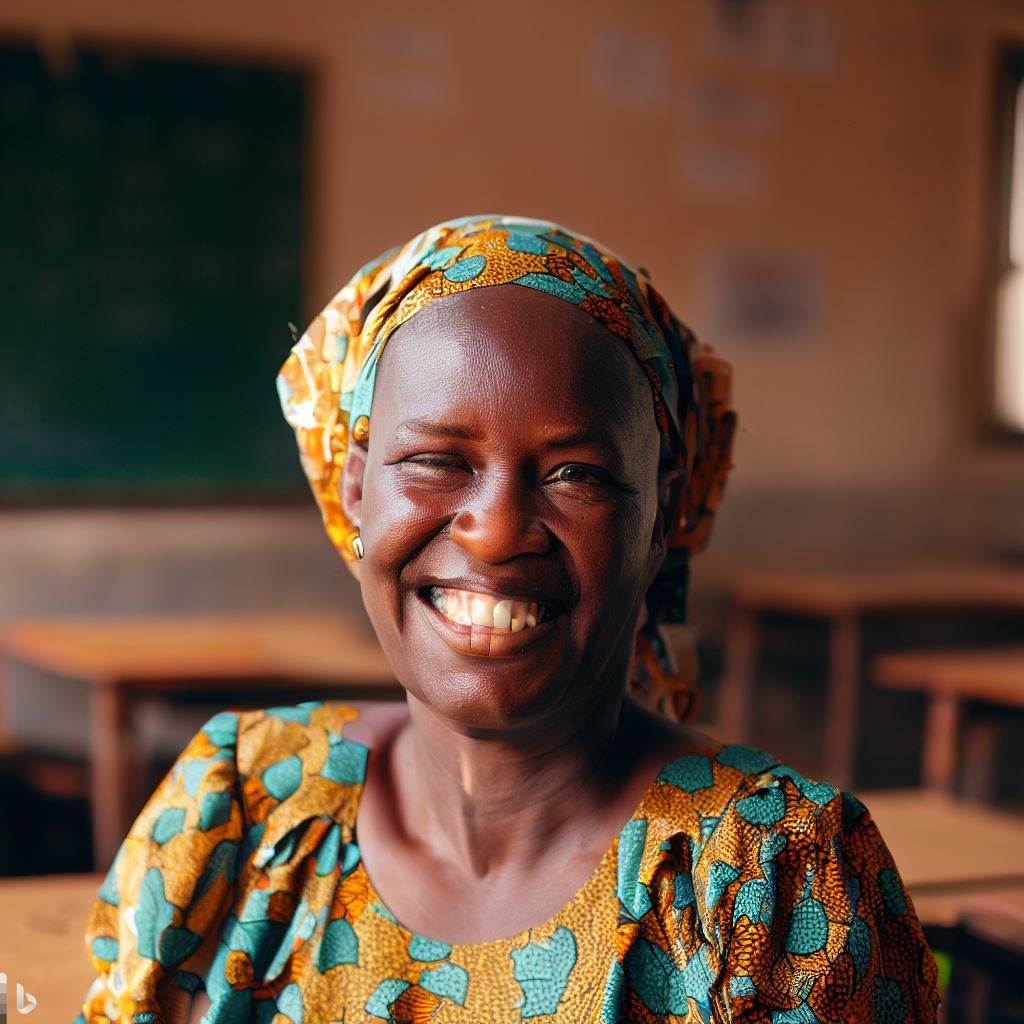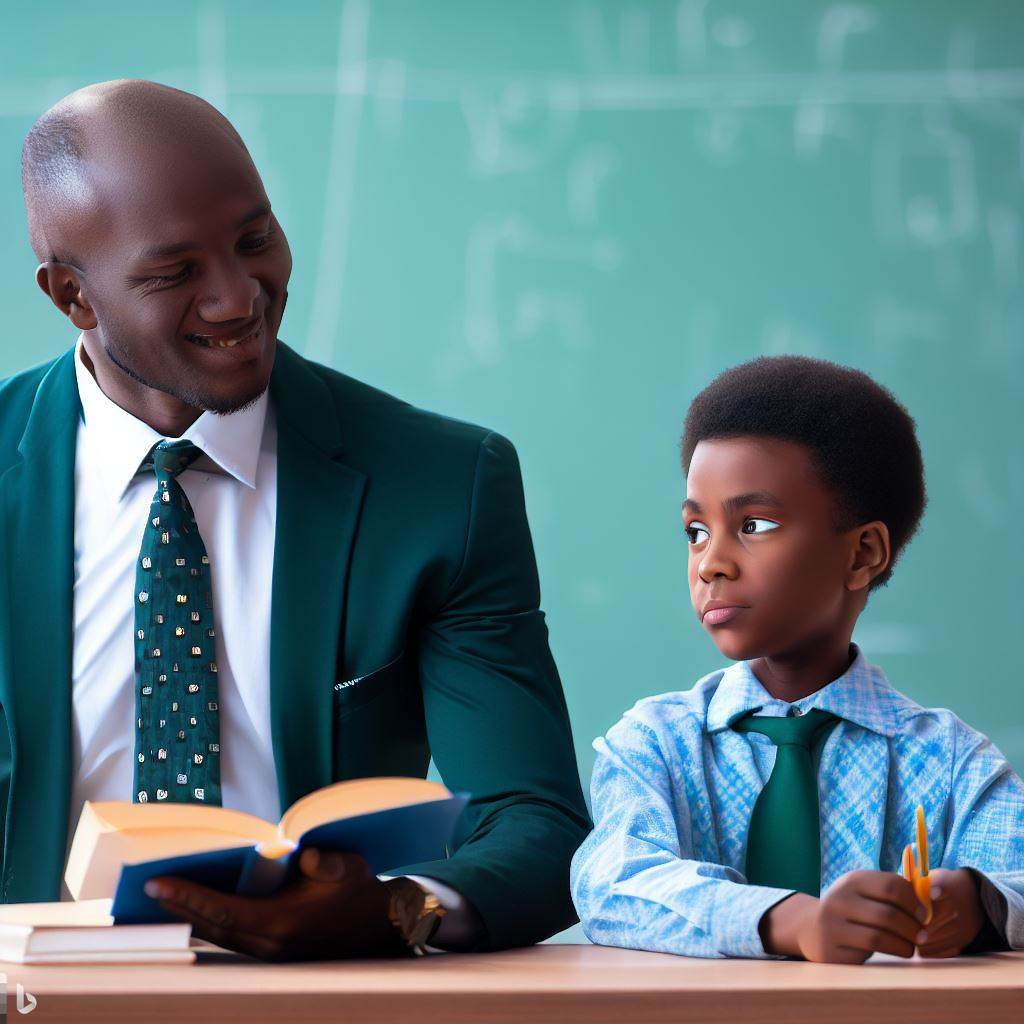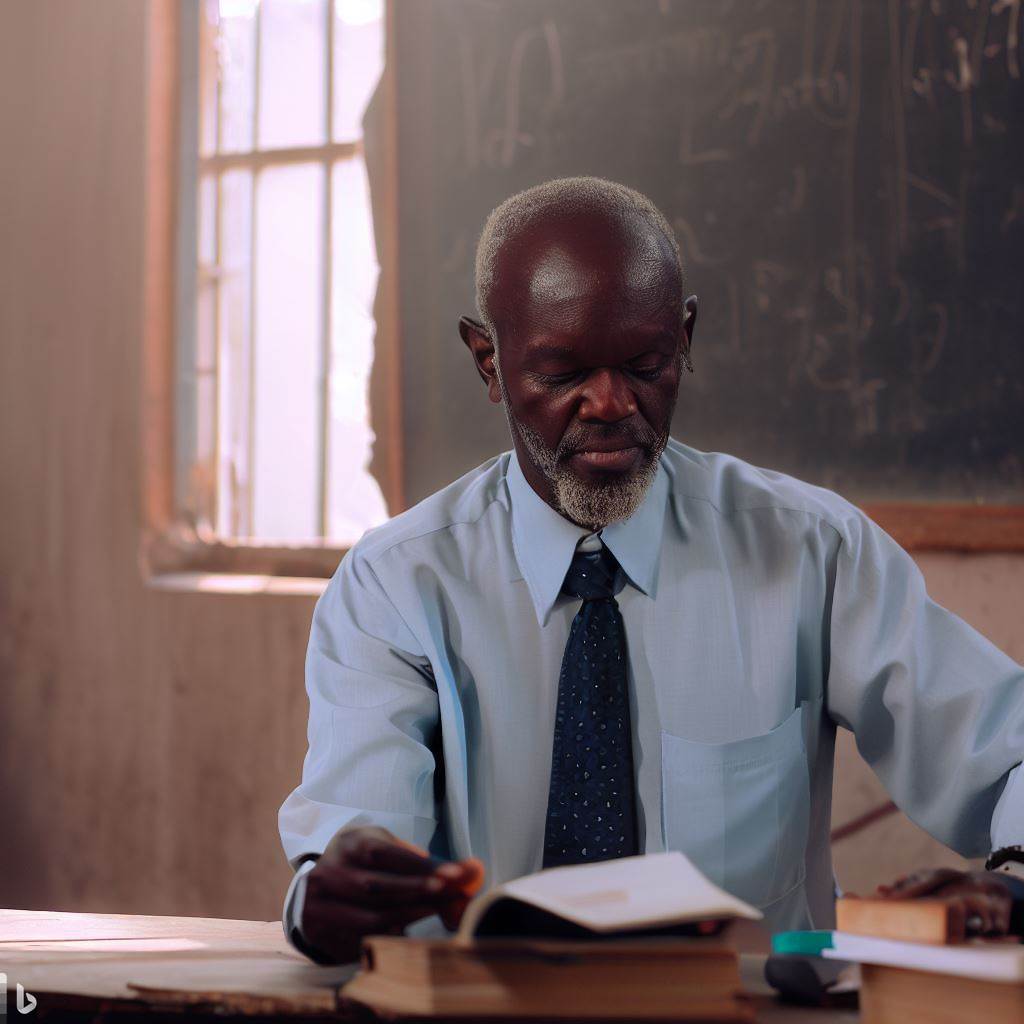Introduction
Every child deserves access to a quality education, regardless of their abilities or disabilities. In Nigeria, the importance of special education cannot be overstated.
It is a fundamental aspect of empowering individuals with disabilities and improving their lives.
Imagine a young boy named Ahmed, who was born with a hearing impairment. As he grew older, he struggled to communicate and understand what was happening around him.
His parents were desperate for help but didn’t know where to turn.
Statistics show that in Nigeria, over 13 million children have disabilities, and many of them face significant challenges accessing quality education.
Without special education programs, these children are often left behind, unable to reach their full potential.
Special education is not just about academic learning; it is about providing the necessary support and resources for individuals with disabilities to thrive.
It focuses on developing their strengths, fostering independence, and promoting inclusivity within society.
Children like Ahmed benefit immensely from specialized teaching methods, assistive technology, and tailored curricula that cater to their unique needs.
They gain the skills and confidence to navigate the world with greater ease, improving their overall quality of life.
Moreover, special education promotes social integration and acceptance. It helps break down barriers, dispelling misconceptions and prejudices surrounding disabilities.
By educating society as a whole, we create a more inclusive and equitable environment for all.
In this blog post, we will delve into the inspirational stories of individuals whose lives have been transformed through special education in Nigeria.
These stories are a testament to the power and impact of inclusive education and the tremendous potential that lies within every person, regardless of their abilities. Join us on this journey of hope and transformation.
Background of Special Education in Nigeria
Nigeria, a country located in West Africa, has a current state of special education that is in dire need of improvement.
Individuals with disabilities face numerous challenges and obstacles in accessing quality education and support.
Lack of Resources, Facilities, and Trained Professionals
- One of the major hurdles in special education in Nigeria is the severe lack of resources.
- Schools for special needs students often lack adequate facilities and equipment for their unique requirements.
- There is a shortage of trained professionals, such as special education teachers, therapists, and counselors.
- The limited number of trained professionals contributes to the high student-to-teacher ratio in special education classrooms.
Challenges and Obstacles Faced by Individuals with Disabilities
- Individuals with disabilities in Nigeria often face discrimination and stigmatization from society.
- Many families lack awareness and understanding about disabilities, leading to a lack of support for these individuals.
- Transportation poses a significant challenge for individuals with disabilities, especially those who rely on wheelchairs or mobility aids.
- Inaccessible infrastructure, including public buildings and schools, further limits the participation of individuals with disabilities.
- The lack of inclusive education and inclusive practices in mainstream schools deprives students of opportunities for learning and social interaction.
- Negative attitudes and misconceptions about disabilities make it difficult for individuals to be fully included in society.
The Current State of Special Education in Nigeria
The Nigerian government acknowledges the need for inclusive education and has made efforts to address the challenges.
However, implementation of policies and programs has been slow, and initiatives often fall short of meeting the needs of individuals with disabilities.
There is a lack of funding and investment in special education, resulting in limited access to assistive devices, technology, and specialized resources.
The school curriculum does not adequately cater to the diverse learning needs of special education students.
Many schools lack inclusive teaching practices and fail to provide the necessary accommodations and modifications for students with disabilities.
In the end, special education in Nigeria faces significant challenges due to the lack of resources, facilities, and trained professionals.
Individuals with disabilities encounter various obstacles in accessing quality education and support.
The Nigerian government needs to prioritize special education by increasing funding, improving infrastructure, and promoting inclusive practices in schools to ensure that every individual, regardless of their abilities, can fully participate and thrive in society.
Read: Parental Perceptions of Special Education in Nigeria
Government Initiatives and Policies
In Nigeria, the government has made efforts to promote special education and improve access to quality education for individuals with disabilities.
Various policies and programs have been implemented to address the unique needs of these individuals and enhance their educational opportunities.
1. Implementation of Inclusive Education Policy
The government has adopted an inclusive education policy to ensure that children with disabilities are included in mainstream schools.
This policy aims to create an inclusive learning environment where students with disabilities can learn alongside their peers without disabilities.
It focuses on removing barriers to learning and providing necessary support services and accommodations to meet the diverse needs of students with disabilities.
2. Provision of Special Needs Education Centers
The government has established special needs education centers across the country to provide specialized education and support services for individuals with disabilities.
These centers offer a range of programs and services tailored to the specific needs of students with disabilities, including physical, sensory, intellectual, and developmental disabilities.
They provide individualized instruction, therapy, and assistive technologies to enhance the learning experience and promote the overall development of these individuals.
3. Integration of Assistive Technologies
The government has recognized the importance of integrating assistive technologies into special education to enhance the accessibility and learning experience of individuals with disabilities.
Assistive technologies such as screen readers, speech recognition software, and adaptive devices are being used to facilitate access to educational materials and promote independent learning.
These technologies not only support academic achievement but also foster inclusivity and empowerment among individuals with disabilities.
4. Training and Professional Development
The government has prioritized the training and professional development of educators and special education professionals to ensure they have the necessary skills and knowledge to cater to the diverse needs of individuals with disabilities.
Training programs and workshops are conducted to equip teachers with effective instructional strategies, classroom management techniques, and inclusive practices.
This initiative aims to build the capacity of educators and promote inclusive education practices in schools and special needs education centers.
5. Collaboration with NGOs and International Organizations
The government has collaborated with non-governmental organizations (NGOs) and international organizations to strengthen the implementation of special education initiatives.
These collaborations have resulted in resource sharing, capacity building, and the provision of funding for special education programs and infrastructure.
International organizations such as UNESCO and UNICEF have been actively involved in supporting the government’s efforts to promote inclusive education.
Effectiveness and Impact of Government Initiatives
The government’s initiatives and policies have had a positive impact on special education in Nigeria.
The implementation of inclusive education policies has increased the enrollment of individuals with disabilities in mainstream schools, promoting social integration and reducing stigmatization.
The establishment of special needs education centers has provided specialized services and support, ensuring that individuals with disabilities receive tailored instruction and interventions.
This has contributed to their academic progress and overall development.
The integration of assistive technologies has enhanced accessibility and created equal learning opportunities for individuals with disabilities. It has also fostered their independence and self-confidence.
Furthermore, the training and professional development initiatives have improved the competencies of educators, enabling them to effectively address the diverse needs of students with disabilities.
The collaboration with NGOs and international organizations has enhanced the availability of resources and expertise in the field of special education, strengthening the government’s efforts in promoting inclusive education.
Despite these achievements, challenges remain. Limited funding, inadequate infrastructure, and a shortage of trained professionals continue to hinder the full realization of inclusive education in Nigeria.
However, the government’s commitment and ongoing efforts indicate a positive trajectory towards improving special education and transforming the lives of individuals with disabilities.
Read: The Demand and Supply Gap of Special Ed Teachers in Nigeria
Personal Stories of Success
Special education in Nigeria has played a pivotal role in transforming the lives of individuals with disabilities.
Through personalized attention and tailored educational programs, these individuals have been able to overcome obstacles, achieve remarkable milestones, and experience a more fulfilling life.
In this section, we share inspiring stories of some of these individuals and shed light on their achievements, personal growth, and the improved quality of life they have attained.
Olamide’s Journey to Independence
Olamide, a young girl with visual impairment, joined a special education school at the age of six. With the help of dedicated teachers, Olamide learned Braille and developed strong academic skills.
She excelled in her studies and went on to become the first visually impaired student to attend university. Today, Olamide is a successful lawyer, advocating for the rights of individuals with disabilities.
Special education not only provided Olamide with academic support but also empowered her to become an independent and accomplished individual.
Emeka’s Remarkable Transformation
Emeka, a boy with autism, struggled with communication and social interaction in his early years. Enrolling in a special education program helped Emeka develop crucial life skills and overcome his challenges.
Through the use of therapy and specialized teaching methods, Emeka’s communication abilities improved significantly.
Emeka now confidently interacts with others and has discovered a passion for painting. Special education not only transformed Emeka’s life but also unlocked his hidden talents and potential.
Aisha’s Journey of Self-Discovery
Aisha, a young girl with Down syndrome, faced numerous obstacles in her educational journey. Special education provided Aisha with a supportive and inclusive environment where she could thrive.
With the guidance of skilled educators, Aisha discovered her love for music and developed her singing talent.
She participated in various competitions and performances, captivating audiences with her melodious voice.
Aisha’s journey exemplifies how special education can unlock hidden talents and provide individuals with a sense of purpose and fulfillment.
Musa’s Empowerment through Vocational Training
Musa, a young man with physical disabilities, struggled to find employment due to societal prejudices. Enrolling in a special education vocational training program transformed Musa’s life.
He gained skills in computer programming and web development, which opened doors to job opportunities.
Today, Musa is a successful freelance web developer, earning a sustainable income and challenging societal stereotypes.
Special education enabled Musa to overcome barriers and empowered him to lead a self-sufficient and fulfilling life.
These personal stories of success showcase the transformative power of special education in Nigeria.
Through tailored support and inclusive environments, individuals with disabilities can achieve remarkable milestones, realize their hidden talents, and become valuable contributors to society.
It is crucial to continue advocating for accessible and inclusive special education programs to ensure that every individual has the opportunity to thrive and lead a fulfilling life.
Read: Improving Special Education with Nigerian Government Policies

Challenges and Solutions
Special education institutions in Nigeria face various challenges that hinder their effectiveness in providing inclusive education to students with special needs.
These challenges include limited funding, lack of accessibility, inadequate training, and issues with inclusion. However, with the right strategies, these obstacles can be overcome.
Funding
- Insufficient funding is a major roadblock for special education institutions in Nigeria.
- Lack of funds leads to a lack of proper infrastructure, resources, and specialized equipment.
- This shortage affects the quality of education that can be provided to students with special needs.
- Advocacy efforts must be intensified to secure increased government funding for special education.
- Collaboration with international organizations and NGOs can also help bridge the funding gap.
Accessibility
- Many special education institutions in Nigeria are not easily accessible to students with disabilities.
- Limited physical infrastructure, such as ramps and accessible restrooms, hinders their participation.
- Efforts should be made to ensure that all schools are designed and equipped to cater to students with diverse disabilities.
- Integration of assistive technologies can significantly enhance accessibility in classrooms.
- Regular assessments and modifications of physical environments will ensure inclusivity.
Training
- Teachers and educators in special education often lack adequate training and professional development opportunities.
- This knowledge gap affects the delivery of appropriate and inclusive education to students with special needs.
- Investment in comprehensive training programs is necessary to enhance the skills of teachers in special education.
- Workshops, seminars, and online courses should be organized on a regular basis.
- Collaboration with universities and education authorities can help establish specialized training centers for teachers.
Inclusion
- Inclusion of students with special needs in mainstream educational settings is still a challenge in Nigeria.
- Discrimination, social stigma, and lack of awareness hinder the integration process.
- Community sensitization programs should be initiated to promote acceptance and understanding.
- Creating support systems within schools can facilitate the inclusion of students with special needs.
- Individualized education plans should be developed to address specific needs of each student.
Solutions and Recommendations
To overcome the challenges faced by special education in Nigeria, the following solutions and recommendations are proposed:
- Government should allocate a higher percentage of the education budget specifically for special education.
- Private organizations and individuals should be encouraged to support special education initiatives through donations and collaborations.
- Training programs for teachers must be prioritized, including courses on inclusive education and disability awareness.
- Collaboration between special education institutions and mainstream schools should be promoted to enhance inclusion.
- Special education policies and guidelines should be implemented and strictly enforced at all levels.
In a nutshell, special education in Nigeria faces significant challenges in terms of funding, accessibility, training, and inclusion.
However, through collective efforts and strategic interventions, these challenges can be overcome to create an inclusive educational system for students with special needs.
Read: Case Studies: Successful Special Education Teachers in Nigeria
Community Involvement and Support
In the field of special education in Nigeria, community involvement and support play a crucial role in promoting inclusivity and providing necessary resources and assistance to individuals with disabilities.
The active engagement of the community, including NGOs, parents, and volunteers, has contributed significantly to the advancement of special education in the country.
Importance of community engagement in promoting special education
The importance of community engagement in promoting special education cannot be overstated.
By actively participating in the education process, community members can help create an inclusive environment that allows individuals with disabilities to thrive.
Communities that understand and embrace diversity are better equipped to provide the necessary support and accommodations to meet the needs of individuals with disabilities.
Efforts made by NGOs, parents, and volunteers in advocating for inclusivity and providing support to individuals with disabilities
NGOs have played a pivotal role in advocating for inclusivity and providing support for individuals with disabilities in Nigeria.
These organizations work tirelessly to raise awareness about the rights and needs of individuals with disabilities.
They collaborate with schools, parents, and other stakeholders to improve access to quality education and ensure that appropriate services are available to those who need them.
Publish Your Professional Profile, Business or Brand
Showcase your expertise, gain trust, and boost visibility instantly on Professions.ng.
Publish NowParents also play a significant role in championing for the rights of their children with disabilities.
They advocate for their inclusion in mainstream education and work closely with schools to ensure their children receive the necessary support and accommodations.
By actively engaging with the education system, parents can help drive positive change and ensure that individuals with disabilities have equal opportunities to learn and grow.
Volunteers have also made a profound impact on the lives of individuals with disabilities in Nigeria. Their dedication and selflessness contribute to the overall support system in special education.
Volunteers often provide one-on-one assistance to students, help with classroom activities, and create inclusive recreational programs.
Their presence fosters a sense of belonging and helps individuals with disabilities develop valuable social and interpersonal skills.
Community involvement and support are essential components of a comprehensive and effective special education system.
The combined efforts of NGOs, parents, and volunteers create an environment that supports inclusivity and equal opportunities for individuals with disabilities.
These initiatives not only benefit students but also contribute to the overall advancement and understanding of special education in Nigeria.
Read: Insights into the Teaching Profession in Nigeria Today
Impact on Society
Special education has had a profound impact on society in Nigeria, with its development positively affecting the country as a whole.
The potential economic, social, and cultural benefits of inclusive education are significant, and it is crucial to break down barriers and promote equal opportunities for all.
Economic Benefits
- Special education in Nigeria creates employment opportunities for educators and therapists specializing in this field.
- By providing education and support to children with disabilities, special education contributes to a more skilled and diverse workforce.
- It enables individuals with disabilities to develop skills and knowledge that can lead to employment, reducing poverty rates.
- Inclusive education also opens doors for entrepreneurial initiatives, as it empowers individuals with disabilities to become active contributors to the economy.
Social Benefits
- Special education promotes social integration, allowing children with disabilities to interact and learn alongside their peers without disabilities.
- It fosters empathy, understanding, and acceptance among students, breaking down stereotypes and promoting inclusivity.
- By offering specialized support and resources, special education enhances the overall well-being and quality of life for individuals with disabilities.
- Through inclusive education, children with disabilities develop social skills that enable them to build meaningful relationships and actively participate in their communities.
Cultural Benefits
- Inclusive education promotes cultural diversity by valuing and celebrating the uniqueness and contributions of individuals with disabilities.
- It challenges societal norms and attitudes towards disabilities, fostering a more inclusive and culturally rich society.
- By giving children with disabilities access to education, the nation is preserving and enriching its cultural heritage through their unique perspectives and experiences.
- Inclusive education also encourages the involvement of parents and communities in the educational process, strengthening cultural bonds and promoting collaboration.
Importance of Breaking Down Barriers
- Breaking down barriers and promoting equal opportunities for all is essential for creating a just and inclusive society.
- By providing accessible and quality education to all children, regardless of their abilities, Nigeria is working towards achieving the Sustainable Development Goal of quality education for all.
- Embracing inclusivity fosters a sense of belonging and empowerment, ensuring that no one is left behind or excluded from educational opportunities.
- It enables individuals with disabilities to reach their full potential and contribute to the betterment of society as productive, confident, and independent citizens.
In fact, the development of special education in Nigeria has demonstrated its positive impact on society.
The economic benefits, social integration, cultural enrichment, and the importance of equal opportunities for all highlight the significance of inclusive education.
By continuing to invest in special education, Nigeria can build a society that upholds the rights and dignity of every individual, regardless of their abilities.
Conclusion
In this blog post, we explored the stories of special education in Nigeria and its impact on changing lives.
We discussed the challenges faced by students with disabilities and how special education has provided them with opportunities for growth and success.
Special education has proven to be a crucial aspect of inclusive education in Nigeria. It not only supports students with disabilities but also emphasizes the importance of equality and inclusivity in education.
By providing tailored support and resources, special education has helped students overcome barriers and achieve their full potential.
It is vital for readers to recognize the significance of special education in changing lives in Nigeria. We must understand that every individual deserves equal opportunities in education, regardless of their abilities.
By supporting initiatives that promote inclusivity and equality in education, we can contribute to transforming lives and creating a more inclusive society.
We encourage readers to get involved in initiatives that aim to make education more inclusive and accessible for all.
This can involve volunteering at special education schools, donating resources to support students with disabilities, or advocating for policies that prioritize inclusive education.
Together, we can create a society where every individual, regardless of their abilities, can thrive and succeed.
Let’s join hands to make a difference in the lives of students with disabilities and ensure they have equal opportunities for a brighter future.




